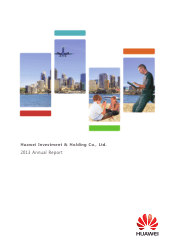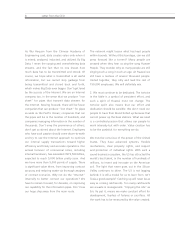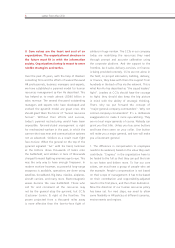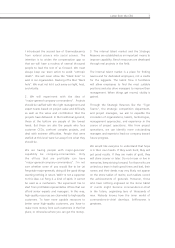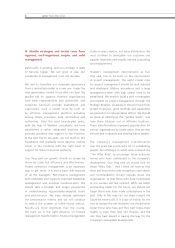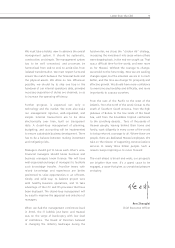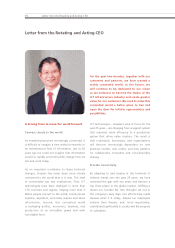Huawei 2013 Annual Report Download - page 6
Download and view the complete annual report
Please find page 6 of the 2013 Huawei annual report below. You can navigate through the pages in the report by either clicking on the pages listed below, or by using the keyword search tool below to find specific information within the annual report.
5
Letter from the CEO
Will ultra-broadband be the last battle in the
electronic equipment manufacturing industry? I
don’t know what others think about it; but to
me, it will. If we fail in the ultra-broadband age,
we will have no more chance to turn it around. I
was in Moscow not long ago. I told our people
there that the city of Moscow is one circle after
another, and the country’s most powerful and
wealthiest people live in the area encircled by
MKAD (the Moscow Ring Road). For more than
ten years however, no Huawei equipment has been
deployed within MKAD. Can our ultra-broadband
prosper in Siberia? If we cannot grab opportunities
in high-value locations with massive data traffic,
then our business in that market will eventually
shrink and we will be marginalized. Today the
paradigm of value distribution is being redefined.
To survive, we must strive to establish ourselves at
high-value regions with massive data traffic. Our
technology is being used in Tokyo, London, and
many other major cities. I believe we will also build
our presence within MKAD of Moscow.
3. Self-criticism is the most important behavior
for survival. It has started in our company since
we embraced the beliefs that “from the ashes the
phoenix is reborn” and “those who climbed out of
the pit of setbacks are sages”. Such self-correction
has helped us to maintain steady growth over the
years.
Our company moves forward on two wheels:
technology innovation based on customer needs,
and scientific exploration into the longer future.
Huawei must have the courage to embrace
disruptive innovations through self-reinvention and
self-criticism. While fully tapping into the value of
our installed business, we should not be pushing
away disruptive innovations in the fear they might
smash our “golden bowl”.
With the establishment of the 2012 Laboratories,
we intend to use the tool of self-criticism to
question ourselves, our status quo, our future
thoughts, and the questioning itself. 2012
Laboratories is studying the approaches of adapting
to disruptive technical innovations, as well as the
ways of applying sustaining innovations to today’s
technologies in order to make them future-proof.
In the age of Big Data, we must move decisively
to seize the high ground and create high-end
products that meet customer needs. With regard
to our low-and-mid-ranged products, consumer
electronics from Germany and Japan should be
the benchmark for the hardware, which ideally
does not need any maintenance throughout the
service life; the software can be upgraded online.
Our high-end products are not absolutely stable,
so our services have to come along.
The times are moving way too fast. If we are
complacent and stand still just for three months,
we will be erased from history. We survive till today
because we have been embracing self-criticism
since a long time ago. In 2013, our Board
members reflected on the company’s problems
in the Bombarding Huawei series; our mid- and
senior-level managers wrote and published
Management Issues in Our Eyes. There were a
mountain of such introspective articles. I reviewed
and edited every piece of them before being
published. Our people can also post their critical
opinions at our online forum. Sooner or later there
will be departments coming out to resolve these
issues. The company will keep improving itself.

